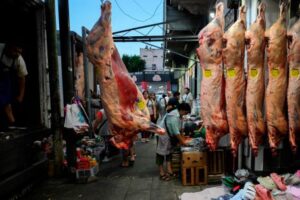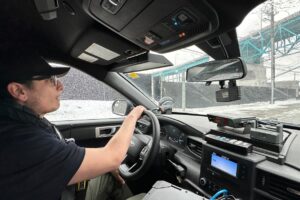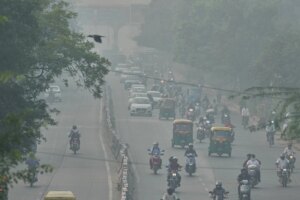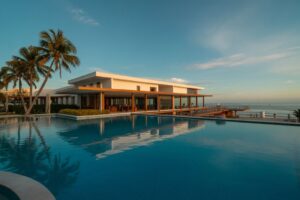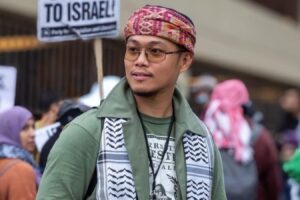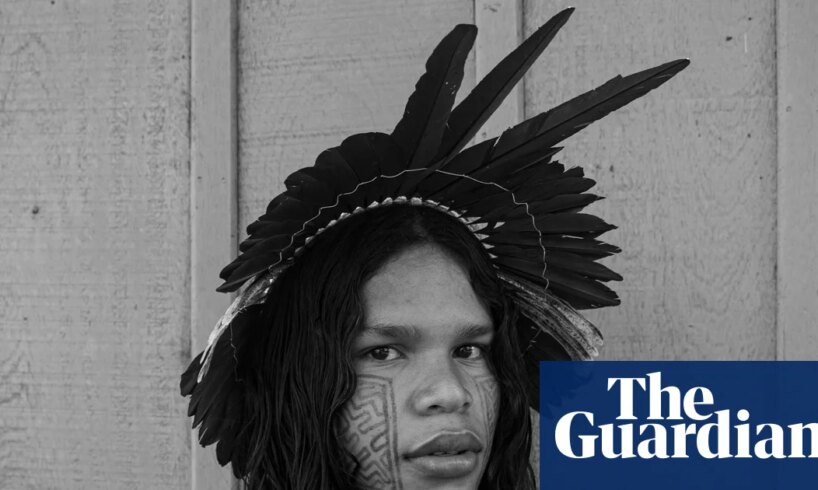
There we were at the edge of the forest. The computer screen had been up for a long time, everything arranged so that nothing would go wrong; that the internet wouldn’t go down, that the computer battery wouldn’t die, and a glass of water and ice in front of me so I wouldn’t be left without words. Silence filled the other side of the camera until a figure appeared, and there he was: António Guterres, the man who speaks for the world, the secretary general of the United Nations.
A few weeks earlier, I had received an invitation from Jonathan Watts of the Guardian newspaper, asking me to interview Guterres with him. I accepted. It would be my first time speaking to someone with that level of authority. But what would I ask him?
I am a young Xipai Indigenous man, and have lived my entire life in a village in the middle of the largest tropical forest on the planet, the Amazon. As an Indigenous man, I know very well the pain of the forest, because its body is an extension of ours. When I speak of the body of the forest, it is neither this nor that; it is everything. It is the other humans who live within it: it is a tree, it is the ground, it is the river, and those who live within it. So I knew my questions would be intertwined with everything that constitutes me as an Indigenous being.
The United Nations tells me I am the first Indigenous journalist to exclusively interview Guterres. I understand how symbolic and powerful this is; the UN chief was willing to listen to and answer questions from an Indigenous person a few days before the largest climate conference on the planet, Cop30, which will take place in Belém.
This is powerful, but I couldn’t help but wonder: how many other leaders are willing to listen to and respond to Indigenous peoples? And for how long will this willingness last beyond Cop30? There needs to be more than this 30-minute interview. There should be the same amount of time they spend without listening to us.
UN chief António Guterres: ‘We don’t want to see the Amazon become a savannah’ – video
When the forest speaks, the world should listen
What’s it like from Guterres’s perspective to see our planet-home as it gradually becomes hostile? I know what it’s like, in my skin and in my soul. I believe he also understands it in his soul, so I imagined what his response would be if I took him to my territory. He would have to leave via the only city we frequent, Altamira, to reach my land. The journey would be by speedboat, and depending on the time of year, it would take between three and six days. Part of the journey would involve navigating the Xingu River, then entering another river, the Iriri, the one that runs through my village.
If the trip were in the summer, when it’s dry, he would have to get out of the speedboat several times to help push it, because each summer the Iriri becomes drier, to the point where the boat drags along the riverbed. He could then see with his own eyes that the river would also have distinct greenish hues due to the cyanobacteria blooms, which grow in warmer water, and the nutrients present in the sediments released by illegal mining. I would have liked to ask him if he understands what it’s like to see a river in his village change colour.
Upon arriving in my territory, he would certainly be offered fish to eat, which could be contaminated by some degree of mercury, also released into the river by mining. And if he spent a few days there, he would hear from the leaders about the ways we protect our land from the ever-present threat of people who want to invade it and destroy the Forest. I wanted him to see all of this, not in reports or maps, but in person, the weariness of the river, and the suffering of the fish that no longer breathes as before. And then, how would he answer me?
Perhaps he would respond with something similar to what he said: “It is essential that we gain global awareness that Indigenous communities are our defenders of nature, our defenders of the planet […] the areas they control, these are the areas where nature is most protected, biodiversity is most guaranteed, and the absorption of carbon released into the atmosphere is most guaranteed.”
What he said is true, but it’s also true that the rest of humanity does little to protect us. In Brazil, the greed of the Karaí (which means non-Indigenous in Xipai) leads them to invade our lands, kill our leaders and shamans, rape girls and women, and execute young men on the roadsides. Some people, unable to bear the pain, end up taking their own lives. I feel the rest of the world is ungrateful to us. But even so, we continue because as long as there is forest, there is still us.
I asked Guterres if he understood the idea that most Indigenous peoples have, that we are not separate from nature; that rivers, trees, and other humans are not “resources”, but people like us. They are part of us.
“If I’ve learned anything from the Indigenous peoples I contact in so many parts of the world, it’s this concept,” he said. “Of Mother Earth. Indeed, between nature and humanity there is a single family.”
He seems to understand, but the rest of humanity doesn’t. The idea, intertwined throughout time, that humans are superior to other species has brought us to this crisis we are experiencing today. As Guterres said: “We must be able to end the war we continue, unfortunately, to wage against nature.”
skip past newsletter promotion
The planet’s most important stories. Get all the week’s environment news – the good, the bad and the essential
Privacy Notice: Newsletters may contain information about charities, online ads, and content funded by outside parties. If you do not have an account, we will create a guest account for you on theguardian.com to send you this newsletter. You can complete full registration at any time. For more information about how we use your data see our Privacy Policy. We use Google reCaptcha to protect our website and the Google Privacy Policy and Terms of Service apply.
after newsletter promotion
Guterres doesn’t believe humanity has already crossed a line and forgotten what it is to be Nature. I agree, but I think humanity needs to relearn, because we are getting close to that line, and when we cross we will have a hostile planet awaiting us.
But there’s still time to listen to Indigenous peoples. We know how to be Nature. That’s why I asked Guterres if Indigenous voices will be heard on an equal footing at Cop30.
He replied: “I’m glad President Lula understood that this Cop, which must be the Cop of truth, must listen to what Indigenous communities have to say … about how they protect nature, biodiversity, and help prevent climate change, but also the truth about the successive violations of their rights that we see in so many parts of the world.”
When the river meets the world
After half an hour of conversation, the voice coming from the other side of the world fell silent. The speech was over, but the conversation wasn’t. Amid this crisis of listening that the world is experiencing, this one found its home within me – even though at times I wanted to answer the questions I myself had asked. I hope it has an effect on Guterres as well.
I left with the feeling that many people in the world still need to listen, not to the speeches, but to the sounds of the rivers. To reforest their deforested thoughts, and then act with the speed we need to stop the extermination they are causing, and will cause to our own species.
Guterres understands this urgency, but a part of humanity doesn’t, and they continue to consume our planet. If we continue like this, then the Earth will take revenge.
I think humanity needs to learn again what the river never forgot: persistence. Because the river doesn’t stop. It flows, returns, spreads, skirts the rocks, and continues. Within it live currents, alligators, fish, plants – so many different bodies moving within the same body, breathing together. Perhaps that’s what they’ve forgotten: that we are also part of this current, this great organism that is the Earth. And if the river insists on flowing, even wounded, perhaps there is still hope that humanity will find, in the waters, the meaning of resistance.
